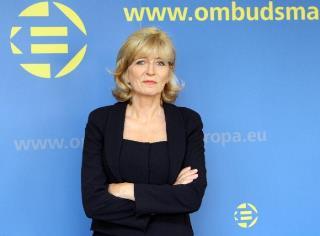Conflicts of interest is a strategic area O’Reilly is pursuing, after having looked at a sample of 54 EU officials who left their job for work in the private sector. She said the inquiry found ‘major deficiencies’ in the way the Commission justifies permissions to leave to a private sector job

Emily O’Reilly: Even if I don’t have powers of a judge, I do have very strong investigatory powers
‘Even if I don’t have powers of a judge, I do have very strong investigatory powers, I can summon officials to question them about their actions’, EU Ombudsman Emily O’Reilly said in a press conference reporting her first year in office. She wants more transparency from EU institutions on letting officials switch to the private sector, negotiating trade agreements, and allowing medicines onto the EU market.
The former Irish Ombudsman has already launched a public consultation about the ongoing EU-US trade negotiations which have drawn criticism for their secrecy and alleged privileged access for industry groups. Questions and remarks by NGO’s are neglected by the negotiators, Eurocrats from Commission and EEAS. Also complaints by memberstates have been woven aside by these public servants. A recent illustration of the arrogance of these negotiators was the answer on concerns of German, French and other governments about another EU deal in the making, with Canada. ‘We are not going to change an iota of the text,’ a senior commission official said. ‘If they want to shoot us down, then let them do that’.
Conflicts of interest is another strategic area O’Reilly is pursuing, after having looked at a sample of 54 EU officials who left their job for work in the private sector. She said the inquiry found ‘major deficiencies’ in the way the Commission justifies permissions to leave to a private sector job. Her proposal is to start a public register where the names and new jobs of EU officials are published. The Ombudsman argues that in this case the public interest trumps the privacy rights!
Other EU institutions are also subject of her scrutiny, such as the European Central Bank, the European Investment Bank and the EU Medicines Agency, which first had a very progressive transparency policy but then caved in to pressure from the pharmaceuticals industry.
Let’s hope that Emily O’Reilly gets re-elected in January by the European Parliament. She can support than the EP in getting an answer of the European Council on the question how it spend over €530 million during the financial year 2012. The Council neglect the Parliament’s questions and refuses to attend the hearings hold by the Budgetary Control Committee.
Viva the EU!







